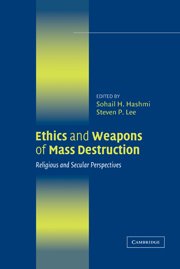Book contents
- Frontmatter
- Contents
- Tables and Figures
- Acknowledgments
- Abbreviations
- Ethics and Weapons of Mass Destruction
- Introduction
- 1 Weapons of Mass Destruction: A Brief Overview
- 2 The International Law Concerning Weapons of Mass Destruction
- PART ONE THE ORIGINAL DEBATE
- PART TWO EXPANDING THE CONVERSATION
- PART THREE CRITICAL PERSPECTIVES
- Contributors
- Index
Introduction
Published online by Cambridge University Press: 05 June 2012
- Frontmatter
- Contents
- Tables and Figures
- Acknowledgments
- Abbreviations
- Ethics and Weapons of Mass Destruction
- Introduction
- 1 Weapons of Mass Destruction: A Brief Overview
- 2 The International Law Concerning Weapons of Mass Destruction
- PART ONE THE ORIGINAL DEBATE
- PART TWO EXPANDING THE CONVERSATION
- PART THREE CRITICAL PERSPECTIVES
- Contributors
- Index
Summary
The term “weapons of mass destruction” (WMD) entered popular parlance some fifty years ago. By convention, though not always without controversy, it has been understood to include not only nuclear weapons – the weapon of mass destruction par excellence – but also biological and chemical weapons. If indeed the last two types are included in the category of WMD, then ethical debates on such weapons date back much further in time, to the late nineteenth century, when chemical weapons became enough of a concern to European states that they moved to delegitimize them even before they were fully developed. Yet attention to the ethics of WMD as a category of weapons distinct from others has been extremely sparse, whether it is among policy makers, the media, or scholars – that is, until recently. The September 11, 2001, terrorist attacks on the United States demonstrated quite clearly the vulnerability of even the most powerful states to large-scale death and destruction perpetrated by a group of committed insurgents. The weapons employed on that day were unconventional weapons of the crudest sort: box cutters and civilian airplanes. After the attacks, however, no one can remain complacent that future terrorism will not involve chemical, biological, or nuclear weapons. The George W. Bush administration argues that the prevention of such an event requires preemptive action, not just against nonstate actors, such as the al-Qa'ida network, but also against alleged state sponsors of terrorism, the regime of Saddam Hussein in Iraq being the first target.
- Type
- Chapter
- Information
- Ethics and Weapons of Mass DestructionReligious and Secular Perspectives, pp. 1 - 15Publisher: Cambridge University PressPrint publication year: 2004
- 1
- Cited by

